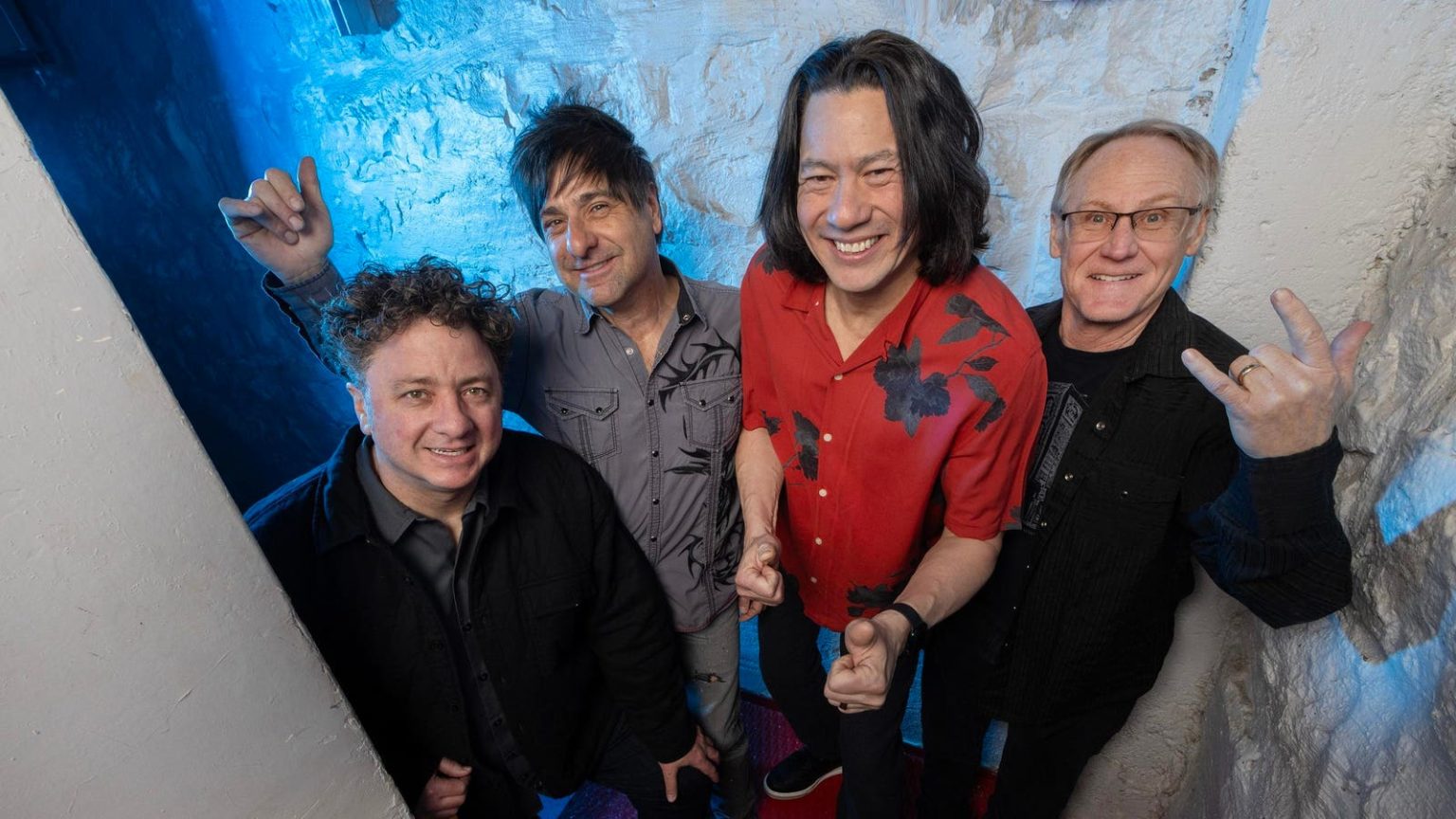Over the course of nearly 40 years, Colorado-based rockers Big Head Todd and the Monsters have sold more than three million albums, incorporating elements of alternative rock and blues tied together by great storytelling and a rock rarity: a consistent lineup.
While the success of singles like “Broken Hearted Savior,” “It’s Alright” and “Bittersweet” drove 1993’s Sister Sweetly album to platinum sales in America, Big Head Todd has carved out its strongest niche on the road, touring relentlessly.
Returning to the road November 12, 2024 in Auburn, Washington, an extensive trek set to take the group across the country into spring, wrapping up April 16, 2025 in Tulsa, Oklahoma, Big Head Todd are out in support of their latest studio album Her Way Out (now available on CD, vinyl or for streaming via Big Records).
Self-releasing the new album brings the group full circle. While they cut their teeth within the major label system that drove alternative music to staggering heights in the 1990s, they actually self-released their first two records prior to signing with a major, forming their own Big Records in 1989.
While the new album marks the group’s first since 2017, it follows their work together in “Monsters Music Monthly,” an online series which found them working together on music each month, staying sharp while performing together in keyboard player Jeremy Lawton’s home studio.
Concepts like navigating life and career, and bettering oneself, are tied together throughout the record by the idea of freedom, with relationships, conflict and strong storytelling driving proceedings.
“Yeah, I guess I’m a wannabe prose writer! I’m a wannabe novelist,” explained Big Head Todd and the Monsters frontman Todd Park Mohr during a recent phone conversation. “And I love songs when they go cinematic – like Springsteen as a writer. I love that. And when a few lines evoke a story, I think that’s a great power in good songwriting that I’ve always strived for,” he said. “On the surface, lyrically, the word freedom comes up an awful lot. And, metaphorically, it probably enters into every song [on the new album] in some way.”
I spoke with Todd Park Mohr about the storytelling at the heart of Her Way Out, the importance of casting a keen eye upon the business side, making a go of it on the road and keeping the group’s founding trio intact since 1986. A transcript of our phone conversation, lightly edited for length and clarity, follows below.
Jim Ryan: I know you guys self-released this album. But, unlike a lot of bands that came up around you, you also self-released your first two before signing with a major label. Did self-releasing then prepare you at all for doing that now?
Todd Park Mohr: I suppose so. We’ve always kind of been more geared towards self-release and a self-business kind of model. So, I guess it has come full circle, let’s put it that way.
Ryan: I know that you guys had road tested the new songs prior to actually recording them. How did these songs sort of grow and evolve prior to actually jumping in the studio and fine-tuning them further?
Mohr: Well, about a third of them got eliminated. So, that’s one way of fine tuning!
The rest of it was really a nice thing. We were able to change keys and tweak in a number of ways, arrangement-wise and so on. We just had so much time both to be able to play it live and kind of sit on the recorded versions that we had. It’s the first time we’ve really had the luxury of just kind of taking our time.
Ryan: How long did you wind up taking?
Mohr: I would say about a year and a half or so from the time we started recording. Maybe another year or so of writing prior to that.
Ryan: You guys were also just coming off of the “Monsters Monthly” series. How did that sort of impact proceedings?
Mohr: Yeah, we really enjoyed doing that. Because it kind of forced us to get together and produce something new every month. We just kind of got in the rhythm of working at Jeremy’s house, which is the scene for most of those monthly things. So, it was sort of a continuation of that workflow. We just stopped making the videos and really focused on the quality of the songs and the performances.
Ryan: Relationships – navigating that. Navigating life and career. Bettering oneself. Those are some themes that sort of jumped out to me. And there is some conflict in there on the record at times as well. Is there a narrative thread or theme in your opinion that sort of connects this batch of songwriting?
Mohr: On the surface, lyrically, the word freedom comes up an awful lot. And, metaphorically, it probably enters into every song in some way.
Whether it’s sort of like an Annie Oakley feminine freedom or freedom from a relationship that was bad or freedom from your past – like in “Glorious Full Moon,” forgiving – the freedom of letting something go. That’s the basics of it to me.
You mentioned conflict and relationships – those are zones that I’m really, really interested in. So, I’m glad that that sort of comes through.
Ryan: Well, you mentioned Annie Oakley. And one of my favorite tracks on Her Way Out is “Don’t Kill Me Tonight.” And it does sort of have a little bit of that western feel and that Buffalo Bill thing. It’s also a great example of the way storytelling matters on this album. What were you kind of going for in terms of the story there?
Mohr: Well, I didn’t have to go for anything – because the story is so incredible on its own. And I get really inspired by real things – real, biographical. That’s marrow to me. So, to find a subject matter that compelling is great. I have another song called “Black Beehive” that I love and our fans love. It’s about Amy Winehouse. But, again, the story sort of tells itself.
But “Don’t Kill Me Tonight.” Annie Oakley married at quite a young age. And they lived a huge number of experiences and years together. And then he died within like a week or two weeks of her passing away. So, it’s a great love story, I think. And a great piece of American history.
Ryan: Another track I love is the closer, “Rainbow Girl.” What’s kind of the story there in terms of closing the album that way?
Mohr: Well, we needed a song that we could play a real theremin solo on! I’m kidding of course.
The basics of “Rainbow Girl,” to me, are inspired by my daughter. It’s interesting. If you have a girl, you see the differences of like guys are really into superheroes but maybe girls not so much. But they are into rainbows and unicorns.
There was a comic book character in the 60s called Rainbow Girl. And her superpower was kind of like emotional – trances and stuff like that. It wasn’t a real popular comic. I don’t think it lasted for very many issues. But the song sort of just is kind of about my daughter’s life and how it would unfold. And the last verse is kind of about her life as an adult.
Ryan: Both of those tracks are great examples of strong storytelling within a song. How important is storytelling to you in your songwriting?
Mohr: Yeah, I guess I’m a wannabe prose writer! I’m a wannabe novelist. And I love songs when they go cinematic – like Springsteen as a writer. I love that. And when a few lines evoke a story, I think that’s a great power in good songwriting that I’ve always strived for.
I like to think that every song I write has some perspective or is telling some kind of story because of that.
Ryan: Whether it’s a screenwriter, a poet, songwriter or anything else, who are some favorite storytellers?
Mohr: Rudyard Kipling. I like all kinds of stories. Tolstoy is a great storyteller. Who else… I like Walt Disney. A lot. Because of his respect for stories and tradition. Obviously, he loved classical music. But he told classical stories. I love Shakespeare. I think that’s just super, super important stuff. I kind of run the gamut I guess.
Ryan: We hit on that idea of self-release earlier. And, obviously, you’ve seen the music industry change radically over the course of the last 25 years as the internet began to rise and the major label system began to fall. Does that force you to kind of keep a little closer eye on the business side now?
Mohr: Wow, that’s a really interesting question. The answer would be a resounding yes.
It’s a difficult business. Because there’s not so much infrastructure – or the services that were related to that infrastructure. So, things like art departments at a major label for example.
As a major label artist, a lot of things are done by a whole team of different specialists. And, when all of that goes away, you’ve got to figure out how to cover it yourself one way or another – or in a smaller scale. Our management company, 7S, they’re terrific. They have to pick up a lot of the slack of the missing label stuff.
It seems like a lot more of a headache these days.
Ryan: We hear these stories about how difficult it’s become to monetize recorded music and how important that has made live performance for artists. You guys tour pretty relentlessly. How important has live performance become for musicians today?
Mohr: Well, for us, it’s the only real source of income. There are some others that are much, much smaller. But our livelihood depends on our live show. And so that’s sort of the whole piece of it.
I always tell young bands to just think about having a good relationship with your audience. I mean, it doesn’t matter how big that audience is. If you can make that work really well – and somebody wants to come back to another show or repeatedly listens to a song – that’s what every band should be striving for. And I think then, if you succeed, even on a smaller level, it has legs to grow.
Ryan: We’ve heard all of these stories the last few years, as live music began coming back following the quarantine of pandemic, about how difficult it’s become to make money on the road thanks to inflation, higher gas prices, etc. What are you seeing out there now?
Mohr: We’ve had a really successful last two to three years. People were really energized to see music. So, everybody’s boats were kind of floated, in a way, by that reopening of live performance.
But I think there’s a little bit of burnout now. And people are tired of being fleeced by the high ticket prices – these superstars and the scaling ticket prices that happens now and all of that. This is just my feeling. But I think there could be a backlash and a slowdown underway.
Ryan: Well, another fascinating element of Big Head Todd and the Monsters has been that ability to keep the original lineup intact for over 40 years. We just don’t see that. What’s been key to keeping it together?
Mohr: I think having a common goal. And listening to each other. We really, I think, learn a lot from each other – like when we’re dialoguing about music or arrangements. And we work together as a band well. Live, we travel well together. There’s not really quote unquote strong personalities in our group. (Laughs) You know what I mean by that?
The healthy functioning of it has just kind of kept us together I think. We still really love learning about music and performing it. And we still feel Big Head Todd and The Monsters have places to go.
Read the full article here





